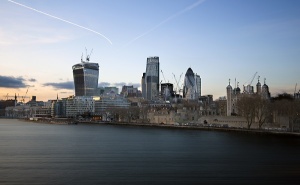FTSE in bear territory as it plummets below 5800 for the first time in 3 years
Last night’s close marked a milestone low for London’s FTSE 100 index as trading concluded below the 5800 mark for the first time in three years. Beginning the year at a very low point, with over £40 billion having been wiped off the prices of listed stocks on London’s benchmark exchange, the downward direction continued […]

Last night’s close marked a milestone low for London’s FTSE 100 index as trading concluded below the 5800 mark for the first time in three years.
Beginning the year at a very low point, with over £40 billion having been wiped off the prices of listed stocks on London’s benchmark exchange, the downward direction continued into the second and now the third week, with last week having represented a fall by £89 billion in combined stock value compared to the end of last year.
At that point, FinanceFeeds provided an insight into certain factors that could be the cause of such a dramatic drop in share prices, and now the bearish trend has continued even further.
Optimism is now quite low, and commentators are making their opinions known.
“We are just two weeks into 2016 and it may already feel like the year of the bear” – David Kelly, Chief Global Strategist at JP Morgan.
Last week, Royal Bank of Scotland publicly told investors to “sell everything” and most certainly this reflects a continued downturn as shares across Europe and commodities continued to plunge.
The Italian stock market closed with a 2.7% downturn, and there has been a huge sell-off as the price of oil dropped to as low as $27.67 before making a very slight recovery.
Crude oil has fallen in value by some 75% since summer 2014 when it was trading at an (albeit inflated) $115 per barrel, however the downward spiral is now so great that many analysts across the entire industry predict that it could go as low as $10 per barrel.
Now, with the lifting of certain sanctions on Iran, it could be that Iran will flood the market with its own oil, further decreasing the price of crude as supply increases.
Retail prices for regular gasoline could fall to 86p at British fuel stations if crude oil drops to $10 per barrel, which is almost half the price that it was 10 years ago.
Yesterday, shares in London’s leading companies spent the day under the cloud of negative sentiment and it has even got to the stage at which bets are being placed at bookmaker Ladbrokes with odds of 10/11 that oil will dip below $25 per barrel following the lifting of sanctions against Iran.
With trading concluding at 5,800 last night, a far cry from April 2014’s all time high of 7,103, and potential currency and stock volatility looming due to the proposed EU referendum, it most certainly appears that analysts that predicted the US to be the stable benchmark territory from which to trade against other venues or currencies were indeed quite correct.









